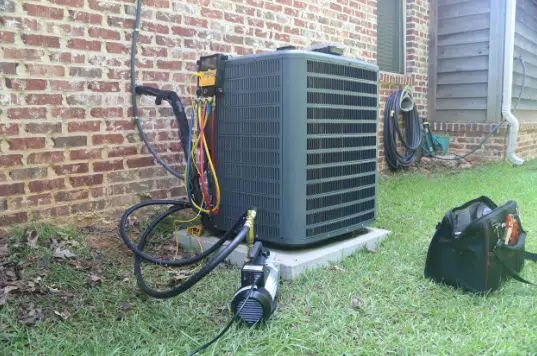There’s been a lot of buzz and confusion about the EPA phasing out R-22 refrigerants. Why is production stopping? Is it illegal to use now? What does this mean for your AC? At Daniel’s, we’ve always taken pride in keeping homeowners informed, and we want to give a full rundown on what you need to know about R-22.
What is R-22 Refrigerant?

The short answer is the R-22 refrigerant, more commonly known as R-22 freon or even just freon, is the stuff that helps your AC cool down your air.
The longer answer is that, way back in the 1700s, scientists discovered that fluids cool down when they evaporate (which is why our bodies produce sweat when we’re too hot). Since then, humans have been trying to come up with a chemical that could reliably cool down without being explosive or generally dangerous.
Fast forward to the late 1920s, when scientists whipped up hydrochlorofluorocarbon (HCFC), which is what we know today as R-22 freon or refrigerant. But while R-22 does a great job cooling and not being flammable (unlike some of its predecessors), it releases chlorine into the air as it evaporates.
Which is why…
R-22 is Terrible for the Environment– and Your Health
When HCFC refrigerants, such as R-22, evaporate, they expel very stable molecules of chlorine into the air. These molecules are so stable, in fact, that they float up into the stratosphere, where, without protection from the atmosphere, they’re eventually broken down by UV radiation.
Once they’re broken down into atoms, the stability from being a cohesive molecule goes out the window. They become incredibly reactive, to the point that they latch onto the ozone (O3) in our atmosphere and create more chlorine atoms. It basically makes a chain reaction of destruction in our atmosphere.
As the chlorine atoms sink back down towards Earth, they react again with various gases and compounds to eventually create hydrochloric acid– AKA acid rain.
It’s obvious from the name alone that acid rain isn’t a good thing. It can destroy plant life and crops, can affect the immune and cardio systems in humans and animals, and has even been linked to cancer.
What Does the Freon Ban Mean For Your Home?
Freon and R-22 aren’t completely banned in the US, meaning that it’s not illegal to buy or use. However, since the US can’t produce or import these refrigerants, it’s going to be much more difficult and expensive to find as time goes on.
Instead, AC manufacturers are swapping over to R-410A, which is a hydrofluorocarbon (HFC) refrigerant. Yeah, that sounds very similar to the hydrochlorofluorocarbon (HCFC) of R-22, but the main difference is that the new refrigerant doesn’t have chlorine and doesn’t deplete the ozone layer.
For homeowners with old air conditioners, we recommend getting a new AC installation to replace your old unit sooner rather than later. AC repair and maintenance will only get more expensive as freon becomes more scarce, so it’s best to get ahead of the curve.
How to Tell if Your HVAC System Uses R-22
Not sure if your air conditioner uses the old freon? We’re here to help! Take a quick picture of your AC unit tag (located on your outdoor compressor unit) and send it to us for a free consultation! We can check the system out and give you recommendations based on what we find.
If you do need to install a new AC, we’re happy to help with that too. We can install a variety of air conditioning brands and manufacturers, and we can advise you on the best system for your home’s needs. We also partner with GreenSky and Synchrony to provide multiple financing options, so you don’t have to wait to get your new air conditioning set up.
